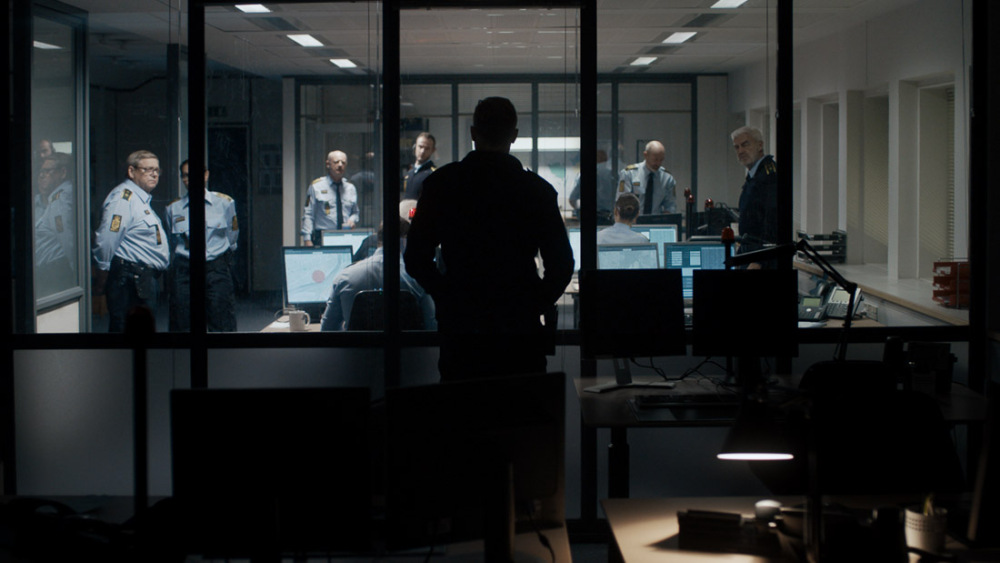I’ll be honest—I’m not well versed in Danish cinema. I’m familiar with the works of Lars von Trier, Nicolas Winding Refn, and Susanne Bier, but The Guilty is the first time I’ve witnessed a Danish film prior to an artist becoming a name in America. And what an introduction it was. Gustav Möller, the co-writer and director behind The Guilty, a single room thriller told almost entirely through phone conversation, has crafted a film that is as taut and tense as an overwound guitar string. The Guilty is a chilling feature debut for Möller that is impactful and captivating.
Jakob Cedergren stars as Asger Holm, a police officer currently suspended from the force and demoted to working on alarm dispatch. Disinterested in his work and desiring to return to active duty, Asger spends his time on the phones treating the callers with disdain. That is until he receives a call from a kidnapped mother of two, named Iben. Unable to leave and join the hunt for Iben himself, Asger spends all of his time at the dispatch center attempting to keep tabs on the situation while also solving the mystery behind the kidnapping. Asger works nonstop, hours after his shift is over, to try and find Iben, calling in favors from former partners, former bosses, and other dispatchers in order to rescue this missing woman he has never met before.
A film like The Guilty requires two things in order to succeed: a strong, captivating lead performance and direction that consistently and constantly builds tension. While setting the film in one room and only featuring a handful of onscreen performances undoubtedly served as a way to work around a slight budget, Möller utilizes these limitations to his advantage. The utilization of lighting in particular does wonders to amp up the tension and prevent the film’s mise en scène from becoming too monotonous and boring. Midway through the film, Asger hides away from the dispatch center’s central hub to a room with a single call node that he turns the lights off and closes the blinds, leaving only a red “call” light on in the room. Möller uses this character beat to keep the film looking fresh and the red lit darkened room helps increase the tension and emphasize the darkness of the film’s latter half.
As for the lead performance, Cedergren does nothing less than carry the film. The reasons for Asger’s demotion are slowly revealed through the film, but the pain and conflict behind the events are behind everything Cedergren is doing with his performance. Cedergren, a veteran of Danish cinema, has that “it” factor that is difficult to put into words. He’s a presence that is impossible to not be captivated by, and The Guilty utilizes this to incredible degree.
Without these two key factors, The Guilty could have been an exercise in futility. The film’s explorations of abuse, trauma, and complicated psychologies wouldn’t work to the degree they do if the film wasn’t as entertaining and thrilling as it is. There’s not an ounce of fat on this film; every frame, every line of dialogue, and every decision in the film is servicing both the narrative and thematic heft of the film. The Guilty explores the psychology of abuse specifically through the lense of an abuser, and it’s really challenging and hefty material, but Möller’s film recognizes this challenge and subtly infuses these themes into a more straightforward narrative crux.
For a directorial debut, Möller is completely in control of his craft here. There’s a masterful ratcheting of tension throughout that he handles deftly, particularly a third act turn that’s subject matter might turn off a significant portion of the audience. But Möller plows through this, making the most of the film’s multiple reveals by rooting everything in Cedergren’s performance as Asger and the character’s mindset. When the film ends and Asger walks out of the dispatch center to face a new day, the audience is can feel it. Möller might be a directorial debutant making his first film in his native language, but I wouldn’t be shocked if his talents found their way overseas and into Hollywood like many other Danish filmmakers have. The man is a genuine talent.1
- Möller is now represented by Hollywood talent agency WME, which could be a sign of future American endeavors.







